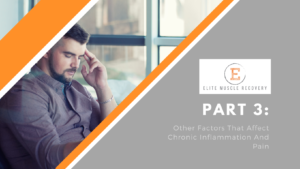Other Factors That Affect Chronic Inflammation And Pain with Dr. Katelyn Renard, PT, DPT, OCS🤗 🤗
“Most people have no idea how good their body is designed to feel.” Kevin Trudeau
In the previous two newsletters, we discussed how food can affect inflammation in our bodies. In the final part of this series, we will look at other factors that can affect chronic pain and inflammation.
Common symptoms of chronic inflammation include:
- Generalized pain
- Fatigue
- depression/anxiety
- GI issues/complications
- Fluctuations in weight
- Recurrent or persistent infections
Factors that can increase inflammation include:
- Poor Sleep
- High/chronic stress
- Physical inactivity
- Social isolation
- Smoking
- Obesity
- Poor diet
- Excessive alcohol consumption
- Exposure to environmental toxins (air pollutants, smoke, industrial chemicals, etc)
We are going to highlight three of these factors in the following tips:
Tip #1: Get enough sleep
Lack of quality sleep can contribute to chronic inflammation, fatigue, headaches, slowed reaction times, irritability, and difficulty with thinking and memory. Sleep deprivation is also linked to heart disease, high blood pressure, diabetes, weakened immune system, and increased pain sensitivity.
Sleep is restorative in nature and vital to the healing process. Adults are recommended to get 7 to 9 hours of sleep per night. Consider turning off all screens at least an hour before bed. Also try to reduce alcohol and food intake in the few hours before you try to go to sleep. Whenever possible, try to maintain a consistent sleep schedule to help your body get into a good rhythm.
Tip #2: Reduce stress
Chronic stress increases cortisol (“stress hormone”) levels in the body, which can cause fatigue, weight gain, depression, and immune disorders. Chronic stress can also contribute to digestive issues, muscular tension, headaches, reproductive issues, difficulty sleeping, heart disease, high blood pressure, and strokes.
Some ideas to reduce stress include deep breathing exercises, relaxation techniques, unplugging from devices and social media, prayer or other spiritual disciplines, and simply learning how to say “no” to things so that you are not overbooking yourself. In some cases, professional help such as counseling may be indicated.
Tip #3: Exercise regularly
Lack of physical activity can contribute to inflammation, fatigue, anxiety, depression, and many chronic illnesses such as Type II diabetes, cardiovascular disease, and high blood pressure. A sedentary lifestyle over many years is also associated with premature mortality.
Physical activity has many benefits for the human body and mind. It is recommended that adults get at least 150 minutes a week of moderate-intensity exercise (for example, a 30 minute brisk walk 5 days/week) plus 2 or more days a week of specific strengthening exercises.
All of these things, in addition to the dietary adjustments previously mentioned, can help reduce chronic inflammation and pain. If you have difficulty sleeping well due to pain in certain positions, physical therapy can help with education and pain-relieving techniques to help you get a good night of sleep. If you are limited in your ability to exercise due to pain or weakness, physical therapy can help by reducing pain and teaching you a proper progression of stretching and strengthening activities. If you have high stress levels, your physical therapist can teach you relaxation and deep breathing techniques and can perform manual therapy to reduce tension in your muscles and help your body relax.
At Elite Muscle Recovery, we use a combination of hands-on manual therapy, stretching, strengthening, and education to help get our clients moving better, sleeping better, and reducing overall stress levels as a result! We’d love to work with you to help achieve your personal goals.
Sources:
https://www.cdc.gov/physicalactivity/basics/adults/index.htm
How Much Sleep Do I Need? | CDC
Kind regards,
Dr. Katelyn Renard, PT, DPT, OCS



